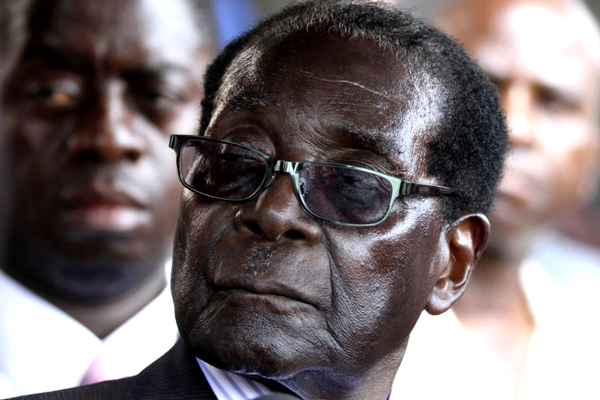
PRESIDENT Robert Mugabe was reportedly offered asylum by his then Senegalese counterpart Abdoulaye Wade in the aftermath of his electoral loss to opposition leader Morgan Tsvangirai at the 2008 polls, former Education minister David Coltart has claimed.
BY RICHARD CHIDZA
In his autobiography, The Struggle Continues: 50 Years of Tyranny, Coltart said former South African President Nelson Mandela had a very low opinion of Mugabe and thought his successor Thabo Mbeki understood the Zimbabwean leader better.
Mugabe lost the first round of voting to Tsvangirai only to force through a violent run-off whose outcome was rejected by the international community and the opposition at home.
As diplomatic efforts to resolve the impasse in Harare continued following the disputed 2002 presidential elections, Coltart said in October 2003 he and former Finance minister Tendai Biti met Wade in Dakar and presented him with a dossier of events in Harare.
The meeting triggered a chain of events that sucked in the Senegalese leader, including a reported altercation with Mbeki over Mugabe.
“We handed him a dossier cataloguing human rights abuses and electoral fraud in Zimbabwe,” Coltart wrote.
- Chamisa under fire over US$120K donation
- Mavhunga puts DeMbare into Chibuku quarterfinals
- Pension funds bet on Cabora Bassa oilfields
- Councils defy govt fire tender directive
Keep Reading
“Being a lawyer himself, Wade was interested to hear the views of two Zimbabwean lawyers. He was sympathetic, and he told us that he would do what he could to get sense to prevail.
“Wade became critical of Thabo Mbeki’s failure to be more proactive in Zimbabwe. In 2009 he offered Mugabe asylum, saying ‘My friend Mugabe does not want to make concessions, we are at a dead end, he can no longer govern the country alone’.”
It was also reported that earlier Wade visited Zimbabwe in 2007, where he had a tense meeting with Mugabe over the deteriorating situation in the country.
Biti confirmed the meetings and that Mugabe had offers for asylum from a lot of other countries. “Wade was part of a new crop of African leaders that found it unpalatable for an old nationalist leader to bog down the continent. We had (John) Kufuor in Ghana, (Mwai) Kibaki in Kenya and a very different (Yoweri) Museveni in Uganda,” he said.
“Mbeki himself was relatively new and Mugabe had become so politically unfashionable that everyone was offering him an opening.”
Zanu PF spokesperson Simon Khaya Moyo said he had not read Coltart’s book and could not say much. “I would not want to comment much because I have not read the book. But I do not know anything about that (asylum),” he said.
Following a State visit to Harare in November 2007, Wade told reporters in Harare that Mbeki had no monopoly on finding a solution to the Zimbabwe crisis.
“We should, at the level of Heads of State, together with brother Mbeki, undertake mediation. I think that Zimbabwe should be treated as an African problem, to be solved by all African leaders,” he was quoted as saying.
“Thabo Mbeki does not have the sole right to meet with Mugabe. Mbeki has done a lot, but the problem has not been solved.”
Wade’s visit to Harare had been postponed twice as relations between him and Mugabe remained clouded by suspicion.
After meeting with Wade, Coltart said he had stopped over in South Africa before a chance meeting with revered anti-apartheid icon Mandela.
Coltart said he had explained to Mandela that “because of his deep-rooted fears, Mugabe was unlikely to give up real power through dialogue” and Mbeki needed to appreciate that given the latter’s “policy of quiet diplomacy”.
“Madiba [Mandela’s clan name] responded by saying that Mbeki was a shrewd politician who understood Mugabe, but that he was also in danger of losing Africa on the issue — something he could not afford,” the former legislator wrote, adding Mandela had spoken of his personal clashes with Mugabe including a threat to walk out on regional bloc Sadc if “Mugabe was allowed to continue his antics”.
Mandela, according to Coltart, told him most regional leaders were scared of Mugabe except former Malawian President Bakili Muluzi.
“He [Mandela] said that other regional leaders, save for President Muluzi, feared Mugabe and would not stand up to him, complicating Mbeki’s ability to deal with the situation,” Coltart said.
Coltart also disclosed there had been a plan to bring African leaders Kufuor, Kibaki and Botswana’s Festus Mogae in an effort to aid Mbeki’s mediation efforts.
“That they in turn approach Mbeki in a supportive and understanding manner to strengthen his arm in dealing with Mugabe, without alienating Mbeki from the rest of Africa. I expressed the hope that Madiba could encourage that process as Mugabe, he [Mandela] said, ‘didn’t appear to care about his people or the economy’,” the former Education minister wrote.
However, while Mandela had shown willingness to help in finding a solution, he had reservations about Mugabe’s ability to take advice.
“Madiba replied that he did not think he would be ‘very welcome in Mugabe’s Zimbabwe’. I responded by saying that tyrants come and go and that I looked forward to the opportunity of welcoming him to my constituency one fine day.
“I then stressed that his role was best behind the scenes and that he should be involved in ‘quiet diplomacy’ within the ANC,” the book says.
Coltart’s book has so far proved to be a treasure trove of historical information, upsetting Vice-President Emmerson Mnangagwa, who at one point threatened to sue after the book quoted him allegedly making hate speech.












